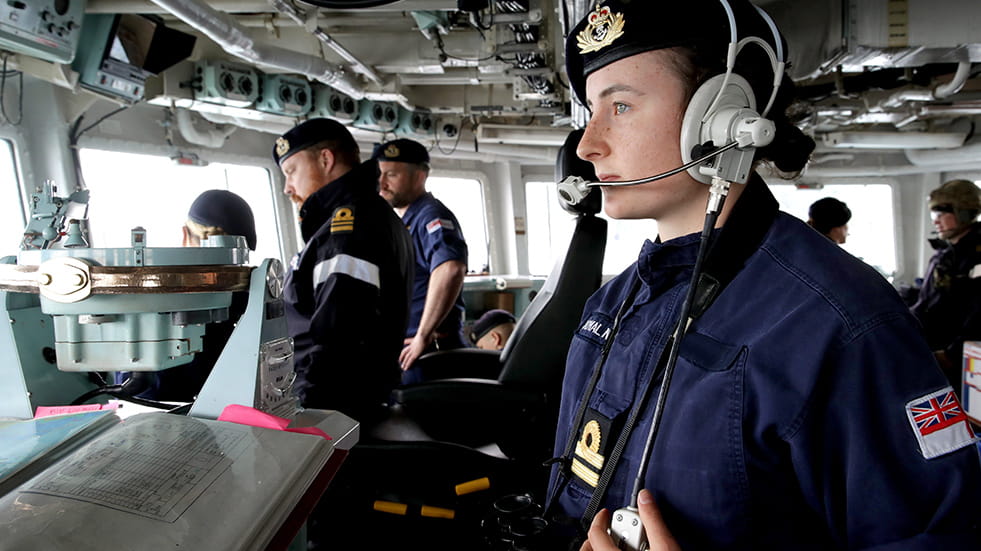Warfare Intelligence Officer
Being in Intelligence means that you work with all disciplines within the Royal Navy and other services to deliver Intelligence to Commanders on operations.
High interest role
This is a highly competitive role with potential long lead time to join.
You may wish to consider joining the Royal Navy in one of these similar roles:
- £31,000 - £110,500
- A-Levels / college qualifications
- Surface Fleet
- Warfare
- Officer level
£38,500
6 weeks
Free
Management
Travel

As an Intelligence Officer in the Royal Navy you get to conduct, supervise and manage analytical intelligence inputs to support Operations around the world.
Role details
What you’ll do
Being in Intelligence means that you work with all disciplines within the Royal Navy and other services to deliver Intelligence to Commanders on operations. As an Intelligence Officer you will find yourself leading a team of highly motivated, bright and flexible men and women. Your training will enable you to develop fused Intelligence products using the latest reporting from a variety of sources, including open source, imagery, signals, human and cyber intelligence. These products will be utilised to provide advice on emerging situations and deliver bespoke briefings to senior officers. Your Intelligence input will aid in mission success.
Intelligence is critical in supporting warfighting and getting the right information to the right people at the right time so that crucial decisions, that affect lives, can be made. Everything could depend on your speed, skill, accuracy and powers of concentration to keep one step ahead of the enemy.
Your role
- Provide Intelligence updates and threat assessments to support operational planning
- Provide Intelligence support to Operational Commanders to support operations
- Lead teams of skilled intelligence analysts to provide intelligence products
Pay & benefits
- A starting salary of over £31,000
- Rising to around £38,500 after just two years
- An excellent pension scheme
- Six weeks of paid holiday every year
- Free medical and dental care
- Extra pay for every day spent sea
Skills for life
Qualifications you'll gain
- We’ll make a significant contribution towards GCSEs, Masters degrees, and everything in between
- Gain internationally recognised professional qualifications as your career progresses
Skills you'll develop
- Gain the unique naval leadership and management skills that are highly valued by civilian employers.
- Gain analytical skills that are internationally recognised and are applicable across a wide range of employment sectors.
Eligibility
- You’ll need to be aged 18 to 39
- You’ll need a minimum of 72 UCAS points. These can be accrued from either GCE A/AS levels (or equivalent) or National Diplomas (e.g. BTEC)
- You’ll need at least 5 GCSEs at grades A*-C (9-4) (or Scottish equivalent), which must include English language and Mathematics
- You, your surviving parents and your spouse/partner must hold sole British citizenship and you must have continually resided in the UK for a minimum of 10 years
- Developed Vetting (DV) is required (A Security Clearance (SC) application does not need to be submitted as well)
- A Body Mass Index (BMI) between 19 and 28 (between 17 and 27 if under 18)
Skills & Interests
- An ability to thrive on responsibility and lead from the front
- Confidence in making key decisions in high-pressure situations
- Team players with a passion for analytics
- Problem-solvers, who can work well as part of a team
- A high level of physical and mental fitness
- Be able to think on your feet
Joining Process
From picking your role to the first day of training; everything you need to know as an officer
Submit an application
Defence Aptitude Assessment (DAA)
You’ll be tested on: Verbal Reasoning, Numerical Reasoning, Work Rate, Spatial Reasoning, Electrical Comprehension and Mechanical Comprehension.
To prepare, you can practise the DAA
Interview
Medical and eye tests
Pre-Joining Fitness Test (PJFT)
Interview
You’ll have a short interview to assess your suitability for a career in the Royal Navy, and to ensure you’re ready for the Admiralty Interview Board (AIB)
Admiralty Interview Board (AIB)
This stage is unique to officers and takes place in two parts. A Pre Recorded Interview (PRI) is an online assessment which assesses your motivation to join the Royal Navy as an officer and your awareness of the Royal Navy. The Group Planning Exercise (GPE) is the second stage of the AIB and is an online competency based assessment which will take place on a separate day to the PRI. It will be conducted in a virtual group environment and you will be assessed on your contribution to the team based on your individual performance
Career Progression
Got a question?
Our virtual recruiter is available to answer your questions 24 hours a day